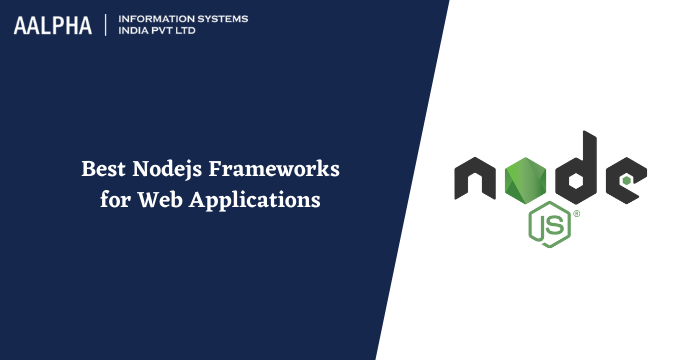The need for web apps has grown as many companies utilize them to improve the user experience. In response to this growing need, developers constantly evaluate new frameworks that provide sophisticated capabilities for developing online apps. Some may allow for more development flexibility, while others may encourage automation. As a result, selecting the appropriate framework may be challenging, much more so when there are so many.
Table of Contents
Is Node.js considered a framework?
There has long been controversy about whether Node.js is a framework. Generally, we do refer to it as one. However, Node.js is a JavaScript runtime environment – a platform for server-side JavaScript execution and portability. In layman’s terms, a runtime environment is a context in which a program is executed.
Check: nodejs development
The Best Node.js frameworks 2025
-
Koa.js
Koa, one of the most popular Node.js frameworks, excels in creating various web services or APIs. Koa makes developing these APIs a breeze since it quickly handles HTTP middleware through a stack-like approach.
Additionally, it constructively normalizes Node flaws. With this framework, you may keep several representations of information for visitors using the same URL, such as translating a page, customizing content in eCommerce websites, and having multiple picture formats.
Another advantage of Koa is that it is remarkably like Express. You can still make use of Express’s versatility while creating code with greater freedom and less complexity.
Features:
- It is a Customizable and Futuristic Framework—it is sometimes referred to as a lightweight version of Express.
- Extremely tolerant of errors.
- Has middleware that cascades (Personalizing user experience).
-
Express.js
Express.js, abbreviated as Express, is a top-notch Node.js framework. It takes a fundamental approach and seems to be a clear and traditional framework for coding architecture. Moreover, it was officially released in 2010 and is licensed under the MIT license, making it the de facto standard for Node.js.
It does not require a higher learning curve; instead, a fundamental knowledge of the Node.js environment and programming abilities are sufficient. Moreover, its asynchronous, fast, and robust architecture fits well with Node.
Express is compatible with the Node.js platform’s high-speed I/O operations and single-threaded nature, making it a mandatory need for applications developed with the Node.js platform.
Express has many robust capabilities that elevate backend programming to a new level.
Features:
- Rapid server-side programming packages- the framework exposes many Node.js capabilities as functions, simplifying the process with a few lines of code.
- Asynchronous programming provides high performance by allowing several operations to be performed independently of one another.
- Remarkably high-test coverage enables the development of applications that are as testable as possible.
-
Socket.io
While all these real-time applications are linked and share the critical characteristic of real-time response and request updating, we need Socket.io to set up the capability.
Socket.io is a JavaScript framework that facilitates real-time applications and the establishment of bidirectional communication between web clients and servers. Moreover, you may use this library framework to build apps that need WebSocket development. For instance, messaging apps such as WhatsApp constantly run for live updates and periodically refresh the background process for new messages or changes. Additionally, it provides real-time statistics while requiring fewer lines of code.
Features:
- Binary assistance (with a client-side library and a server-side library)
- Support for multiplexing
- Reliability
-
Node.js
This is a forward-thinking Node.js framework for developing dynamic and scalable enterprise-grade apps and providing complete freedom via its large library ecosystem.
It is the ideal illustration of a backend productivity enhancer. You may use this framework to create multilayered business apps since Nest.js does not prevent you from using its libraries extensively.
The framework’s compatibility with a subset of JavaScript (i.e., code written in Typescript) adheres to the clean-code philosophy while retaining the code complexity required for large-scale projects. Additionally, nest integrates well with sibling frameworks like Fastify and Express.
Nest is the optimal synthesis of object-oriented and functional reactive programming styles (FRP). As a result, it can quadruple developers’ productivity and application performance while also saving significant time.
Features:
- A command-line interface for a modular structure and features
- Straightforward learning curve
- FRP to aid in the simplification of complicated graphical user interfaces (ex. games, robotics)
-
Total.js
Among these frameworks, Total.js is the only one that provides a CMS-like experience and includes almost everything you need in a Node.js environment. It is a full-featured open-source framework that provides developers with maximum freedom.
The framework is available in various flavors, including Ecommerce, Content Management System, and HelpDesk. Your application will have a greater future potential for Internet-of-things integrations, REST services, and ultra-fast apps with minimal maintenance costs and reliable service with these variations.
The framework is well recognized for its ability to monitor users in real-time in contemporary applications.
Features:
- Real-time tracking
- API Validation
- Projects that are discovered automatically.
Wrapping Up
Node.js frameworks simplify building online and mobile applications due to their enormous potential for improving mobile and web application development. With rapidly changing technology, it is critical to scrutinize our project requirements and resource availability while selecting the framework that provides the most remarkable outcomes.
